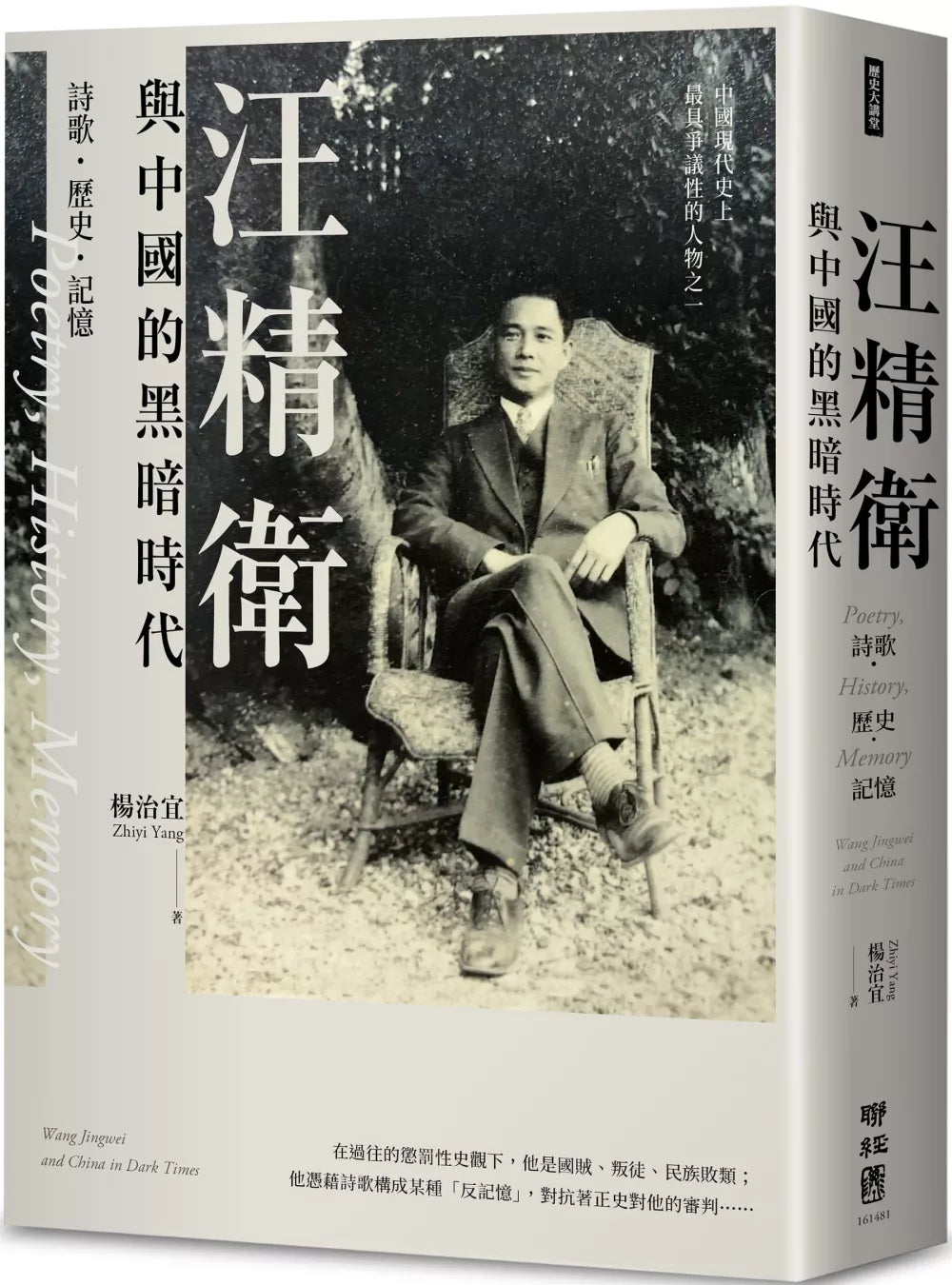1
/
of
1
Wang Jingwei and China's Dark Ages: Poetry, History, and Memory
Wang Jingwei and China's Dark Ages: Poetry, History, and Memory
Yang Zhiyi
Regular price
$30.99 USD
Regular price
Sale price
$30.99 USD
Unit price
/
per
Low stock
Couldn't load pickup availability
About Book
About Book
Poetry, History, Memory: Wang Jingwei and China in Dark Times
Wang Jingwei—one of the most controversial figures in modern Chinese history. In the past, punitive historical perspectives viewed him as a national traitor, a traitor, and a traitor to the nation.He used poetry to construct a kind of "counter-memory" to resist the judgment of official history...
A young man full of ideals, living in an era darker than today, the choices he made in the face of political dilemmas will forever bring him into disrepute. Re-examining Wang Jingwei and the history of the Republic of China, with a creative cacophony of voices, broadens his interpretation of Wang's poetic memory.
Wang Jingwei—poet and politician, patriot or traitor, a "failed man of history"—has never been properly told, let alone deeply explored. The importance of his biography is evident, as it is linked to an ongoing war over cultural memory: in mainland China today, any impartial scholarship on the wartime collaborationist regimes, and Wang Jingwei in particular, is prohibited. At this critical moment, when the memory of World War II is fading from "living memory" and transforming into "historical memory," this intellectual blockade undoubtedly affects China's memory of its own role in the Second World War.
In Wang Jingwei and China's Dark Ages, Yang Zhiyi blends diverse methodologies into a richly fruitful dialogue, including meticulous poetic exegesis. Yang argues that Wang Jingwei's lyric poetry, as a public performance of his private voice, played a central role in constructing his political identity and profoundly influenced how he is remembered after his death. Drawing on archives from mainland China, Taiwan, Japan, the United States, France, and Germany, as well as memoirs, historical journals, newspapers, interviews, and other scholarly works, this is the first biography to explore Wang Jingwei's political, literary, and personal life with a critical perspective and sympathetic objectivity.
Praise from famous experts
Wang Jingwei is one of the most controversial figures in modern Chinese politics and literature. Patriot and traitor, revolutionary and poet, charismatic leader and melancholic soul, Wang Jingwei played many roles in his life, leaving only his poetry to illustrate this mystery. In this groundbreaking study, Yang Zhiyi provides the most profound and convincing commentary on Wang Jingwei's life and works. This is an indispensable work for anyone interested in Sino-Japanese relations in the early 20th century, modern Chinese classical poetry, and lyrical politics. —David Wang, Professor at Harvard University
Yang Zhiyi's book is a timely, startling, and persuasive reexamination of the life of Wang Jingwei, a man often portrayed as a "traitor" by modern Chinese historians since the war. Dazzling and thrilling, with brilliant insights on every page, this is a masterpiece. Most importantly, it explores Wang Jingwei's lyrical personality and convincingly argues that his poetry must play a central role in reconstructing Wang Jingwei's posthumous historical memory—precisely what readers today need. —Sun Kangyi, Professor at Yale University
Today's China has irreconcilably erased the memory of Wang Jingwei, a romantic revolutionary turned despised collaborator. In this remarkable and insightful book, literary scholar Yang Zhiyi offers a captivating meditation on Wang Jingwei's poetry, which expresses what prose cannot, allowing readers to delve deeper into the enigma of Wang Jingwei than any previous author has. —Tim Brook, Professor at the University of British Columbia, Canada
Wang Jingwei was a highly erudite man, educated first in classical Chinese literature and then in Japan and France. His classical poetry has been admired in China for a century, though historians remain deeply divided over his controversial role in the aftermath of the Japanese invasion and his role as President of the "Reorganized Nationalist Government." As a young man, he became a revolutionary hero for his attempted assassination of the Regent. As an intellectual leader and senior politician of the Kuomintang, he was widely considered Sun Yat-sen's political heir. However, after Sun's death in 1925, he fell under the military strategist Chiang Kai-shek. In this outstanding book, Yang Zhiyi offers an objective biography of Wang Jingwei and a precise and accessible interpretation of the messages in his poetry, reflecting his lyrical self-portrait at a critical moment in modern Chinese history. This book is essential reading for anyone seeking to understand the true history of the Pacific theater of World War II and the tragic end of a key statesman who could have led China onto its Third Way. —Jon Eugene von Kowallis, Professor at the University of New South Wales in Sydney, Australia. In this beautifully written and rigorously researched book, Yang Zhiyi challenges oversimplified views of Wang Jingwei, a notorious but influential historical figure. Taking an empathetic neutral stance and avoiding nationalist or defensive narratives, this book successfully reconstructs Wang Jingwei's intentions for his poetry to be understood and remembered by future generations. It demonstrates the power of poetic analysis to explore repressed memories and political dilemmas. —Xu Bin, Associate Professor, Emory University
The scholarly research in this book provides a profound and detailed rethinking of Wang Jingwei's legacy, contributing to our understanding of the two approaches China has taken to modernization: nationalism and cooperation. —Yang Haosheng, Associate Professor, University of Miami
Publication Date
Publication Date
2024-07-11
Publisher
Publisher
聯經出版公司
Imprint
Imprint
Pages
Pages
536
ISBN
ISBN
9789570874006
share

